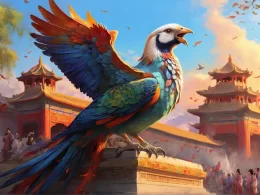Idiom Explanation:
A hair is tied to a thousand catties of weight, describing a critical situation. Jun, a unit of measurement in ancient China, takes thirty pounds as one jun.
Pronunciation:
千钧一发
qiān jūn yī fà
origin:
《列子·仲尼》:“发引千钧,势至等也。”
Liezi - Zhongni: "The hair leads to a thousand pounds, the potential to equal."
story:
In 154 B.C., the third year of the reign of Emperor Jing, Liu Qi, the King of Wu, dissatisfied with the gradual weakening of the fiefs of the vassal kings, Liu Pi gathered six vassal kings, including Chu, Zhao, Jiaodong, Jiaoxi, Jinan, and Zichuan, and rebelled under the banner of "clearing the king's side and punishing Chao Cuo" (because Chao Cuo was in charge of cutting down the vassals). This was called the "Rebellion of the Seven Kingdoms of Wu and Chu".
According to Ban Gu's "The Book of Han", a famous writer of rhetoric in the early years of the Western Han Dynasty, Mie Cheng first served as a governor in the court of King Liu Pi of Wu. At the beginning of Liu Bi's rebellion, Mei Cheng was strongly opposed to it, and he wrote "The Book of Admonishing the King of Wu" to dissuade him from rebellion. He wrote, "Now the situation is very critical, as if a thin thread is hanging high in the air with a thousand pounds hanging from it, and down in a deep pool, the thread is in danger of breaking at any moment." However, Liu Pi, the king of Wu, did not listen to his advice and insisted on rebellion. Mie Xie had no choice but to run to King Liang Xiao to escape from the danger.
In order to seek temporary peace, Emperor Jing disregarded his years of favor with Chao Cuo and killed Chao Cuo against his conscience. After Emperor Jing killed Chao, he sent Yuan Ang to Wu with the official position of Tai Chang, telling him that he had killed Chao and restored his fief to ask Liu Pi, the king of Wu, to withdraw his troops. By this time, Liu Bi had already won several battles and captured a lot of territory. Zongzheng, who went with Yuan Ang, met Liu Bi first and asked him to worship the imperial edict. Liu Bi laughed arrogantly and said, "I am already the Eastern Emperor, why should I worship the imperial edict?" So he refused to see Yuan Ang, but kept him in the army and wanted him to join the rebel army and appointed him as a general, but Yuan Ang refused. Then Liu Pi, the king of Wu, sent a captain with 500 soldiers to surround Yuan Ang in the army and tried to kill him. When Yuan Ang got the news, he escaped from the Wu army camp in the night and finally returned to Chang'an. In this way, Liu Bi, the king of Wu, revealed that the so-called "clearing the king's side" was a deception.
At that time, Deng Gong, a lieutenant who came back to Chang'an from the front to report the military situation, came to see Emperor Jing. Emperor Jing asked him, "You came back from the front, did you hear that Chao was dead and Wu and Chu had retreated?" Deng Gong said, "The King of Wu has been preparing for a rebellion for decades, and his anger over cutting his fiefs and his demand to execute Chao is just an excuse, and his intention is not against Chao alone. Now kill Chao wrong, I am afraid that the world's scholars from now on shut up, never dare to speak again." Emperor Jing asked, "Why?" Deng Gong said, "Chao was worried that the vassal kingdoms were getting stronger and the court could not control them, so he proposed to cut their fiefs in order to strengthen the position of the central government, which was beneficial to all generations. The plan has just begun to be implemented, but the whole family was killed, so that internally the mouth of the loyal subjects, but externally for the vassal king to take revenge, I think your Majesty is not desirable."
After listening to Deng Gong's insightful analysis of the fact that after killing Chao Wu Chu still did not retreat, Emperor Jing sighed a long sigh and said, "You are right, and I repent." But it was too late to regret. Thus, Chao was able to be rehabilitated. However, this no longer meant anything to Chao.
Seeing that the compromise of sacrificing Chao and restoring the cut fiefs could not make the seven states of Wu and Chu retreat, Emperor Jing had no choice but to firmly use military means to put down the rebellion. Under the attack of Zhou Yafu and other troops, Liu Bi, the king of Wu, was defeated and killed, while the other six rebel kings either committed suicide or were executed. Liu Bi's long-prepared rebellion was completely crushed in less than three months. The words of Mei Cheng were fulfilled. Later, people reduced the phrase of "A single strand of responsibility is tied to the weight of a thousand pounds" in the Book of Admonishing the King of Wu to "a thousand pounds of hair" and "a thousand pounds of hair" to describe a very critical situation or It is also used as "a thousand catties" to describe a very critical or dangerous situation.
Similar Idioms:
- 危在旦夕












